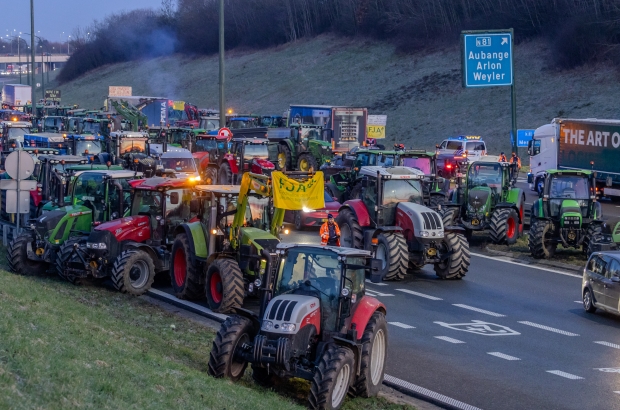- Daily & Weekly newsletters
- Buy & download The Bulletin
- Comment on our articles
'Enough is enough': Farmers step up protest actions
Farmers in Belgium – young ones, in particular – are planning a number of actions to protest against what they describe as an increasingly untenable situation.
Central to their grievances are inadequate incomes, overly complex legislation and excessive red tape.
“The oldest among us realise that the profession has really changed and that we now spend two hours a day at our desks when we have other things to do,” said Henry Lhoest.
“I don't think the political world has realised that every time it adds another layer to the administrative burden, it imposes on us. And at some point, enough is enough.”
Farmers staged tractor marches in Wallonia over the weekend and the Federation of Young Farmers (FJA) coordinated several blockades, including one scheduled for Monday that intends to bring the Daussoulx interchange to a standstill.
“It's important to make ourselves heard and understood, so the blockade on the E42 at Daussoulx is going to be total,” said FJA president Florian Poncelet, a livestock farmer in Léglise, Luxembourg province, adding that soft actions are no longer of any use, and now is the time to “tighten the screws”.
Caroline Jaspart-Herbiet, president of the Union des Agricultrices wallonnes (Walloon Farmers' Union) stopped short of endorsing the blockade.
“We must not let ourselves be pushed around, that's for sure, but we must remain correct,” Jaspart-Herbiet said. “We have to have the public on our side and not against us. Above all, it's a symbol. It's really to show that we're out there.”
For their part, unions have said they would coordinate actions so as to limit the impact on ordinary Belgians, with the Walloon Farmers’ Union even rescheduling one because “citizens should not have to foot the bill and our aim is to be constructive and get things moving”.
The mobilisations in Wallonia will continue to take place in the coming days, mirroring similar actions in France and Germany.
“We're starting to feel the pinch,” said farmer Aline Depas. “At some point, politicians have to wake up and understand that farmers are the backbone of society.”
Farmers are demanding a decent income, which includes remunerative prices for their produce. They are also denouncing certain environmental measures and administrative overload, as well as the risks posed to them by the conclusion of free trade agreements such as the treaty currently being negotiated between the EU and the Mercosur bloc of South American countries.
Young farmers emphasise issues such as access to land and the transfer of farms.
"The political decisions taken since the 1990s have placed European farmers in a globalised market that gives pride of place to excessive competitiveness," the union said.
"It is inconceivable that we can be the most virtuous agricultural sector in the world, while at the same time allowing foodstuffs produced to much lower standards to enter Europe, thereby creating unfair competition with European farmers.
"From CAP reform to CAP reform, the political class is adding layers of regulations that are completely unworkable. The CAP needs to be overhauled without delay and without any taboos.”
Older farmers have the same concerns, and point out the unsustainability of their industry over generations.
“The average age of a farm manager is 55. Only one in five farmers aged 50 and over declares that they have a successor, and 40% already know that they will not have one,” the FJA said.
The FJA has requested a meeting with agriculture minister David Clarinval to discuss these issues and others.
Photo: Julien Warnand/Belga



















